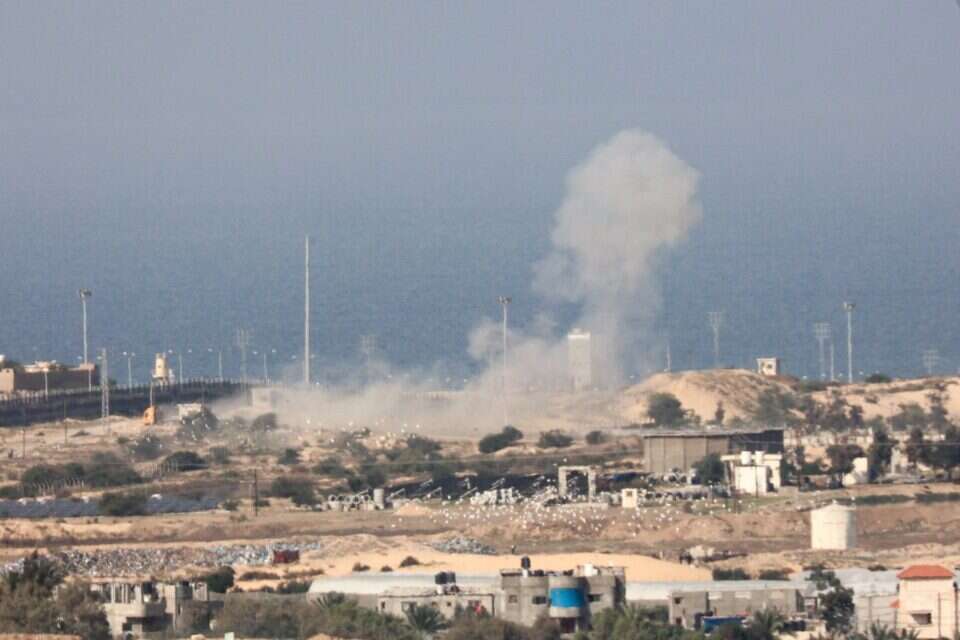During the fighting in Gaza so far, the IDF has refrained from conducting an in-depth military operation in the city of Rafah in the southern Gaza Strip and its environs.
The next issue expected to reach the War Cabinet is activity in Rafah and the Philadelphi Route, when it must decide whether to advance full action to cleanse the city, as has been done in the rest of the Gaza Strip, Israel Hayom has learned. So far, the IDF has made do with surgical strikes, even though Hamas is known to have military and civilian infrastructures there.
Still, there is a well-founded suspicion that there are still smuggling tunnels under the city's homes, half inside the Gaza Strip and half under Egyptian sovereignty, and they may still be active. As long as the IDF does not cleanse the city, there is no certainty that the flow of weapons will stop.
Footage from Rafah crossing: Hundreds looting goods from aid trucks, yesterday // Photo: Arab networks
Another area in dispute is the Philadelphi Route near Rafah. The route is of enormous strategic importance, and until Israel's withdrawal from it in 2005, it was critical to prevent arms smuggling into Gaza. Although there is broad agreement that there is great benefit in taking it over, so far Israel has refrained from doing so.
Nevertheless, it should be noted that since the outbreak of the war, the IDF has indeed operated several times in the southern city. Yesterday, it became known that the IDF had assassinated Subhi Farwana, who was involved in transferring tens of millions of dollars to Hamas. Activity on the Philadelphi route is also planned, but it is unclear what its scope will be, and whether it is expected to be limited or include a full takeover by the army. In this context, it is important to note that it can be assumed that Egypt and other regional and international actors will have a significant role in managing the Gaza Strip the day after.
Egyptian President Abdel Fattah el-Sisi, who was elected to a third term this week, expressed his strong opposition to Gazans entering Egypt since the start of the war. In a speech in Suez, the president told the troops: "Your main task is border defense." Sisi also made it clear that he strongly opposes any absorption of Palestinian refugees in the Sinai Peninsula, and warned that such a scenario would lead to the establishment of a terrorist enclave.
In a speech marking his victory, he said, "The country faces challenges at all levels, chief among them the ongoing war on our eastern borders. This requires mobilizing all our efforts to prevent any threat this war poses to Egyptian national security in particular, and to the Palestinian issue in general."
Humanitarian aid trucks entering the Gaza Strip through the Rafah crossing (archive), photo: AFP.
"Egypt destroyed tunnels"
It should be noted that Egyptian public opinion is very hostile to Israel, and Sisi himself accused Israel of committing crimes against Gazans. At the same time, an Egyptian journalist and parliamentarian close to the regime wrote that attacking tunnels around the Philadelphi route "is a dangerous development that could lead to an explosion between Egypt and Israel. The airstrikes are carried out a few meters from the Egyptian border. Egypt's borders are a red line."
In the same context, a senior Egyptian military source denied Israel's allegations of tunnels on the border. "The Egyptian authorities are doing their duty, especially with regard to the entry of prohibited substances into the Gaza Strip," he told Arab media. He claimed that "the authorities destroyed all the tunnels used to smuggle from Egyptian Rafah to Gaza Rafah. All of Israel's talk about the Hamas leadership using the tunnels to carry out operations and smuggling weapons is not true."
Meanwhile, Israeli President Isaac Herzog said yesterday at a briefing to ambassadors from around the world: "Israel is ready to hold another humanitarian pause to allow the release of hostages. The responsibility lies fully with Sinwar and the Hamas leadership."
Egyptian President el-Sisi (archive), photo: AP.
Wrong? We'll fix it! If you find a mistake in the article, please share with us

